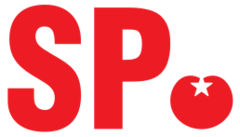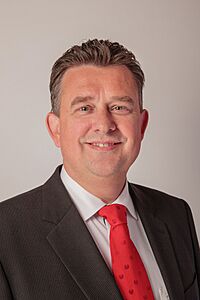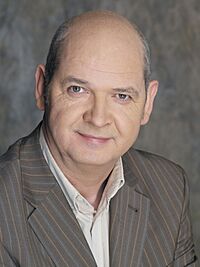Socialist Party (Netherlands) facts for kids
Quick facts for kids <div style="padding-top:0.3em; padding-bottom:0.3em; border-top:2px solid Lua error in Module:European_and_national_party_data/config at line 227: attempt to index field 'data' (a nil value).; border-bottom:2px solid Lua error in Module:European_and_national_party_data/config at line 227: attempt to index field 'data' (a nil value).; line-height: 1;">
Socialist Party
Socialistische Partij
|
|
|---|---|
 |
|
| Abbreviation | SP |
| Leader | Jimmy Dijk (list) |
| Chairman | Jannie Visscher |
| Secretary | Arnout Hoekstra |
| Leader in the Senate | Rik Janssen |
| Leader in the House of Representatives | Jimmy Dijk |
| Founded | 22 October 1971 |
| Split from | Communist Unity Movement of the Netherlands (Marxist–Leninist) |
| Headquarters | De Moed Partijbureau SP Snouckaertlaan 70, Amersfoort |
| Think tank | Scientific Office of the SP |
| Youth wing | SP Jongeren (2022–present) ROOD (2003–2021) |
| Membership (January 2025) | |
| Ideology |
|
| Political position | Left-wing |
| Regional affiliation | Socialists, Greens and Democrats |
| European Parliament group | European United Left/Nordic Green Left (1999–2019) |
| Colours | <span style="background-color:Lua error in Module:European_and_national_party_data/config at line 227: attempt to index field 'data' (a nil value).; color:; border:1px solid darkgray; text-align:center;"> Crimson |
| Senate | Lua error in Module:European_and_national_party_data/config at line 227: attempt to index field 'data' (a nil value). |
| House of Representatives | Lua error in Module:European_and_national_party_data/config at line 227: attempt to index field 'data' (a nil value). |
| States-Provincial |
22 / 570
<div style="background-color: Lua error in Module:European_and_national_party_data/config at line 227: attempt to index field 'data' (a nil value).; width: 4%; height: 100%;">
|
| European Parliament | Lua error in Module:European_and_national_party_data/config at line 227: attempt to index field 'data' (a nil value). |
| King's Commissioners |
1 / 12
<div style="background-color: Lua error in Module:European_and_national_party_data/config at line 227: attempt to index field 'data' (a nil value).; width: 8%; height: 100%;">
|
| Benelux Parliament |
1 / 21
<div style="background-color: Lua error in Module:European_and_national_party_data/config at line 227: attempt to index field 'data' (a nil value).; width: 5%; height: 100%;">
|
| Website | |
| Lua error in Module:European_and_national_party_data/config at line 227: attempt to index field 'data' (a nil value). international.sp.nl |
|
|
^ A: SP has been variously described as left-wing, "old left", far-left, and left-conservative; the latter label is due its more conservative stances on socio-cultural issues. |
|
The Socialist Party (often called SP) is a political party in the Netherlands. It believes in democratic socialism, which means it wants a society where everyone is treated fairly and has equal chances.
The party started in 1971 with a different name, the Communist Party of the Netherlands/Marxist–Leninist. Over time, the SP changed its ideas. It moved away from its original strict communist beliefs towards more democratic and social ideas.
The SP is known for being on the left side of politics. It has usually been in the parliamentary opposition, meaning it works to challenge the government's decisions. In 2006, the SP became a much bigger party, winning 25 out of 150 seats in the Dutch parliament. However, in later elections, its number of seats went down. After the 2023 election, the SP had five seats.
Contents
History of the Socialist Party
Early Years: 1971 to 1994
The Socialist Party began in October 1971. It was first called the Communist Party of the Netherlands/Marxist–Leninist (KPN/ML). This group formed after a disagreement within another communist movement. The founders of KPN/ML wanted a party that focused on working-class people, not just students.
In 1972, the KPN/ML changed its name to the Socialist Party. Even in its early days, the SP focused on helping ordinary people. They set up local offices to give advice and support to citizens. They also created local groups to work on issues like housing and the environment. This helped the SP become strong in many local areas, especially in the city of Oss.
For many years, the SP tried to get seats in the national parliament but didn't succeed. In 1991, the party officially removed the term "Marxism–Leninism" from its goals. This showed that the party was changing its views.
Growth and Changes After 1994
In the 1994 national election, the SP finally won its first two seats in parliament. Their slogan was "Vote Against." During the 1990s, the main left-wing party in the Netherlands, the Labour Party, moved more towards the middle. This made the SP a good choice for some voters who wanted stronger left-wing policies.
In the 1998 election, the SP more than doubled its seats to five. In 1999, the party also gained a seat in the European Parliament.
For the 2002 election, the SP changed its slogan to "Vote in Favor." The party nearly doubled its seats again, reaching nine. They kept these nine seats in the 2003 election. In 2004, the SP doubled its seats in the European Parliament to two.
In 2005, there was a vote in the Netherlands about a European Constitution. The SP was the only left-wing party in parliament that was against it.
The 2006 local elections were a big success for the SP. They won many more seats in local councils. This showed that more people were supporting the party. After the 2006 national election, the SP gained 16 seats, bringing their total to 25. This made them the third-largest party in the Dutch parliament. However, the SP chose to remain in opposition rather than join the government.
In the 2007 provincial elections, the SP gained many more seats. This also helped them increase their number of representatives in the Senate (the upper house of parliament) from 4 to 11.

In the 2010 national election, the SP lost 10 seats, ending up with 15. They kept these 15 seats in the 2012 election. In the 2017 election, the SP lost one seat, and in the 2021 election, they lost five more, bringing them to nine seats. After the 2023 election, the SP's number of seats in parliament decreased to five.
What the Socialist Party Believes In
The SP describes itself as a socialist party. Its main goal is to create a society where everyone has dignity, equality, and solidarity. This means they want people to be treated with respect, have the same opportunities, and support each other.
The party focuses on important issues like:
- Making sure people have jobs.
- Providing good social support for everyone.
- Investing in health care, public education, and public safety.
The SP does not like the idea of private companies taking over public services like healthcare or education. They are also careful about globalisation and are somewhat critical of the European Union (EU).
The SP believes that capitalism (an economic system where private businesses own most things) can lead to unfairness and harm the environment. They want to build a modern socialist society. Their main tasks are:
- To show the problems with capitalism and help people work against it.
- To offer their own solutions for society and fight for them.
- To work with anyone who shares their values, both in the Netherlands and around the world.
The SP also believes that our way of life needs to change to protect nature and people. They think that the current capitalist system is causing environmental damage, wars, and refugee crises.
The SP is sometimes called "left-conservative" because it combines left-wing economic ideas with more traditional views on some social issues. For example, the party has suggested a temporary stop on new migrant workers. They also focus on protecting the working class in the Netherlands. The SP argues that allowing too many cheap workers into the country can harm Dutch workers.
The party is also critical of the EU, saying its policies sometimes help big companies more than ordinary people. The SP has also called for the Netherlands to become a republic, meaning it would not have a king or queen.
In recent years, the SP has spoken out against new Dutch pension laws, calling them "casino pensions." They want the retirement age to be lowered back to 65 and for basic state pensions to be linked to the minimum wage. The party also believes Europe already has enough weapons and only needs limited military investments, not a huge rearmament program. The SP has also strongly supported the recognition of a Palestinian state and has spoken out against the war in Gaza.
Since 1974, the SP has a rule that its elected officials, like Members of Parliament, can only keep a certain amount of their salary. Any money they earn above that amount is given to the party to help fund its work and support its members.
Working with Other Parties
The SP has almost always been in opposition at the national level. However, they have often joined local and provincial governments. The SP is usually the most left-wing party in the Dutch parliament on many issues.
Between 1994 and 2002, the Labour Party often voted against the SP's ideas. But after 2002, when the Labour Party was also in opposition, they started working more closely with the SP against some government policies. Their relationship improved. However, new tensions arose after the 2006 election when the SP gained a lot of support, and the Labour Party joined the government while the SP did not.
Election Results
The Socialist Party has participated in many elections for the House of Representatives, the Senate, and the European Parliament.
House of Representatives Elections
| Election | Lead candidate | Votes | % | Seats | +/– | Government |
|---|---|---|---|---|---|---|
| 1977 | Remi Poppe | 24,420 | 0.29 |
|
New | No seats |
| 1981 | Hans van Hooft Sr. | 30,357 | 0.35 |
|
No seats | |
| 1982 | 44,690 | 0.55 |
|
No seats | ||
| 1986 | 31,983 | 0.35 |
|
No seats | ||
| 1989 | Jan Marijnissen | 38,789 | 0.44 |
|
No seats | |
| 1994 | 118,768 | 1.32 |
|
Opposition | ||
| 1998 | 303,703 | 3.53 |
|
Opposition | ||
| 2002 | 560,447 | 5.90 |
|
Opposition | ||
| 2003 | 609,723 | 6.32 |
|
Opposition | ||
| 2006 | 1,630,803 | 16.58 |
|
Opposition | ||
| 2010 | Emile Roemer | 924,696 | 9.82 |
|
Opposition | |
| 2012 | 909,853 | 9.65 |
|
Opposition | ||
| 2017 | 955,633 | 9.09 |
|
Opposition | ||
| 2021 | Lilian Marijnissen | 623,436 | 5.98 |
|
Opposition | |
| 2023 | 328,225 | 3.15 |
|
Opposition |
Senate Elections
| Election | Votes | % | Seats | +/– |
|---|---|---|---|---|
| 1991 |
|
New | ||
| 1995 |
|
|||
| 1999 | 4,801 | 3.0 |
|
|
| 2003 | 8,551 | 5.3 |
|
|
| 2007 | 25,231 | 15.47 |
|
|
| 2011 | 17,187 | 10.35 |
|
|
| 2015 | 20,038 | 11.9 |
|
|
| 2019 | 10,179 | 5,88 |
|
|
| 2023 | 7,404 | 4.14 |
|
European Parliament Elections
| Election | Votes | % | Seats | +/– | EP Group |
|---|---|---|---|---|---|
| 1989 | 34,332 | 0.65 |
|
New | – |
| 1994 | 55,311 | 1.34 |
|
||
| 1999 | 178,642 | 5.04 |
|
GUE/NGL | |
| 2004 | 332,326 | 6.97 |
|
||
| 2009 | 323,269 | 7.10 |
|
||
|
|
|||||
| 2014 | 458,079 | 9.64 |
|
||
| 2019 | 185,224 | 3.37 |
|
– | |
|
|
|||||
| 2024 | 136,978 | 2.20 |
|
SP in Government
Members in Parliament
The SP has members in both the House of Representatives and the Senate. You can find lists of these members in the articles below:
- List of members of the House of Representatives of the Netherlands, 2023–present
- List of members of the Senate of the Netherlands, 2023–2027
The party currently does not have any members in the European Parliament since the 2024 election.
Local and Provincial Government
Even though the SP is often in opposition at the national level, it plays a role in local and provincial governments. For example, former SP leader Emile Roemer became a mayor and later a King's Commissioner (a representative of the King in a province).
The SP is part of the provincial government in six out of twelve provinces in the Netherlands. They also participate in the local governments of several cities, including Amsterdam and Utrecht.
How the Socialist Party is Organized
Party Name Changes
The party started as the Communist Party of the Netherlands/Marxist–Leninist in 1971. In 1972, it changed its name to Socialist Party. The spelling of "Socialistiese" was a bit different back then due to Dutch spelling changes. In 1993, the party updated its name to the current spelling, "Socialistische Partij."
Party Leadership
The SP has different leaders for various roles:
- Chairmen
- Hans van Hooft Sr. (1971 – 1988)
- Jan Marijnissen (1988 – 2015)
- Ron Meyer (2015 – 2019)
- Jannie Visscher (since 2019)
- Secretaries
- Tiny Kox (1994 – 2003)
- Paulus Jansen (2003 – 2005)
- Hans van Heijningen (2005 – 2018)
- Lieke Smits (2018 – 2019)
- Arnout Hoekstra (since 2019)
- Parliamentary Leaders in the Senate
- Jan de Wit (1995 – 1998)
- Bob Ruers (1998 – 2003)
- Tiny Kox (2003 – 2022)
- Rik Janssen (since 2022)
- Parliamentary Leaders in the House of Representatives
- Jan Marijnissen (1994 – 2008)
- Agnes Kant (2008 – 2010)
- Emile Roemer (2010 – 2017)
- Lilian Marijnissen (2017 – 2023)
- Jimmy Dijk (since 2023)
Party Members
As of January 2025, the SP has about 28,737 members. The party grew a lot after it first entered parliament in 1994. Like many other parties in the Netherlands, the SP has seen a decrease in its number of members in recent years.
How the Party Works
The highest decision-making body in the SP is the party council. This council includes the leaders of all local branches and the main party board. It meets at least four times a year. The party board itself is chosen by the party congress, which is made up of representatives from local branches. The congress makes final decisions on the party's plans and chooses candidates for elections.
The SP is very active outside of parliament. Many of its members work in local campaign groups or in SP neighborhood centers. These centers offer help and support to working-class people.
One example of their national work is the campaign for a National Healthcare Fund. This campaign wants to create a single public healthcare system in the Netherlands. They believe that money should be spent only on healthcare itself, not on things like advertising by health insurance companies.
Related Groups
The youth group of the Socialist Party is called SP Jongeren. The SP also publishes a monthly magazine called Tribune.
The relationship between the SP and its former youth wing, ROOD, became difficult in 2020 because ROOD took a more radical approach to politics. The party officially ended its ties with ROOD in late 2020.
See also
 In Spanish: Partido Socialista (Países Bajos) para niños
In Spanish: Partido Socialista (Países Bajos) para niños
 | John T. Biggers |
 | Thomas Blackshear |
 | Mark Bradford |
 | Beverly Buchanan |


